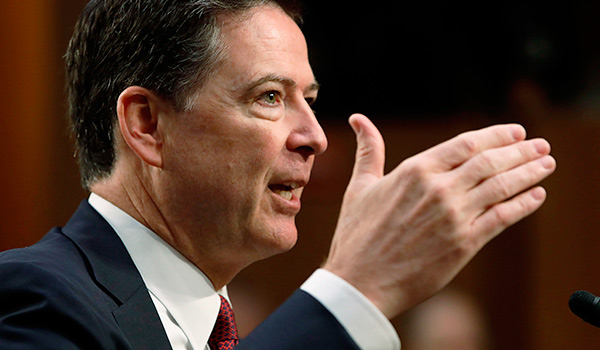by Tiana Lowe – nationalreview.com – June 8, 2017
In testimony before the Senate Intelligence Committee, former FBI director James Comey revealed that a February New York Times article, which asserted that Trump associates and campaign members had “repeated contacts with Russian intelligence” was mostly false.
Responding to Virginia senator Mark Warner, the ranking Democrat on the committee, Comey testified that “in the main,” [the report] “was not true.”
The challenge — and I’m not picking on reporters — about writing on classified information is the people talking about it often don’t really know what’s going on and those of us who know what’s going on are not talking about it, and we don’t call the press to say, “Hey, you got that thing wrong about this sensitive topic.”
The Times published the article just one day after Michael Flynn resigned as Trump’s national-security adviser after misleading Vice President Mike Pence about his interactions with Russian ambassador Sergey Kislyak.
Until today, the February report had not been substantially contested or refuted, and its claims had been widely propagated throughout the media.
Although The Atlantic questioned the “murky” quality of its anonymous sources, CNN and MSBNC covered the report as fact. CNN claimed to have independently confirmed the report a day later with the network’s own unnamed “law enforcement and administration” sources.
Dean Baquet, the executive editor of the Times, doubled down on the report’s reliability following Trump’s CPAC speech during which the president berated the paper’s use of anonymous sources. Baquet told CNN’s Brian Stelter, “I always know who the sources are for these stories. That’s why I’m so confident pushing back at the Trump administration when they criticize the stories.”
The report, described as “concrete” by PolitiFact, set off the four-month long firestorm of public calls for the president’s impeachment.
The day following the report, MSNBC’s Chris Hayes asked Representative Maxine Waters (D., Calif.) for her response.
“I’ve come to conclude that Trump has the Kremlin clan surrounding him and have been involved with him for a long time,” Waters told Hayes.
How is it that all of them, with this background and with their connections end up in the same administration? I tell you, there’s more to be learned about it. I believe there’s been collusion. They were involved in his campaign, and we’ve got to dig. These investigations have got to show the connection and prove that collusion, because for me, I think that leads to impeachment.
On the same day, CNN’s Sally Kohn tweeted in response to the report that it would be “straightforward from here: 1. Impeach Trump & Pence 2. Constitutional crisis 3. Call special election 4. Ryan v Clinton 5. President Clinton.”
A day later, the Huffington Post published an article headlined, “Four Ways to Impeach Trump,” citing the Times report as evidence of a violation of the Logan Act (it’s not). The Guardian declared that thanks to the Times, “the story of the week is Trump, Russia and the FBI. The rest is a distraction.”
That single article quickly became one of the founding documents in the seemingly single-minded mission on the part of some in the media to expose evidence of direct collusion between the Russians and Donald Trump. And while Comey did not allege that the sources themselves where lying, the former FBI director did strongly insinuate that reporters have placed too much faith in sources claiming knowledge of classified information.
 Listen Online
Listen Online Watch Online
Watch Online Find a Station in Your Area
Find a Station in Your Area










 Listen Now
Listen Now Watch Online
Watch Online
